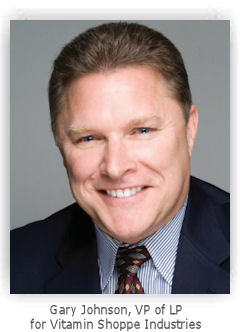Vitamin Shoppe’s Gary Johnson:
LP Leaders Must Be A Catalyst
For Change
By Jennifer Overstreet
Published: May 13, 2013
 Not long ago, retail loss prevention was focused on catching
shoplifters. But over the course of the last couple decades,
the profession has evolved along with the entire industry.
Effectively countering cyber crime, organized retail crime,
workplace violence and other increasingly complex threats
means loss prevention executives are more than a physical
presence in a store – they’re earning a voice in strategic
business decisions and working cross-functionally in
sophisticated ways.
Not long ago, retail loss prevention was focused on catching
shoplifters. But over the course of the last couple decades,
the profession has evolved along with the entire industry.
Effectively countering cyber crime, organized retail crime,
workplace violence and other increasingly complex threats
means loss prevention executives are more than a physical
presence in a store – they’re earning a voice in strategic
business decisions and working cross-functionally in
sophisticated ways.
In advance of our
Loss Prevention Conference next month, we’ve been
exploring how many of today’s seasoned
LP executives have played an integral part in this
evolution throughout the course of their careers. To wrap up
our series, we spoke with
LP Advisory Council Chairman and Vitamin Shoppe Vice
President of Loss Prevention
Gary Johnson about his personal career journey.
Read on to find out how his first employers gave him a leg
up in the business, how rewarding it is to help others and
why retail business savvy is critical to success in LP.
When were you first exposed to the loss prevention
profession? What made you decide to pursue a career in loss
prevention/asset protection?
I first heard about loss prevention while studying law
enforcement at Western Illinois University. I decided to do
my internship with a retailer named Osco Drug because the
thought of catching shoplifters sounded fun — and it was one
of the paid internships! After that, I became quite
interested in it as a career. I always had an interest in
business and law enforcement, and it paid more than a
patrolman with the Chicago Police Department, so it was the
best of both worlds.
How has your unique personal background helped you
succeed in your LP career?
When I began in LP, my early mentors were really retail
operators first and loss prevention professionals second.
They taught me how to sell prevention concepts, how to show
the dollars and cents of a particular initiative, and the
importance of influencing people to want to play a role in
reducing shrink. Certainly, I had to build experience and
confidence with the core competences of loss prevention
techniques, but looking back it was more important to gain
proficiency with retail concepts and “soft” leadership
skills.
Tell us about a particular moment, challenge or success
that made you certain this was the right profession for you.
Wow, there have been many. It’s very rewarding to help
people, whether it’s developing a program that keeps people
safe at work, helping advance someone’s career, or catching
a criminal that has hurt others. For example, I still recall
working at Pier 1 Imports and how gratifying it was to solve
a case involving a string of robberies, one of which
involved a sexual assault of an associate. Working the data
from my office in Fort Worth, I was able to connect numerous
dots and link the right law enforcement agencies. Back in
the day, this sharing of data didn’t frequently happen
between private sector and law enforcement. I’ll never
forget the associate’s reaction when I informed her that the
guy who assaulted her had been caught.
The role of LP is continuing to expand and grow. When it
comes to hiring and promoting team members, what kind of
talent and skill sets are you looking for to be successful
now and in the future?
Yes, the role of LP continues to evolve — and that’s a great
thing! The C-suite has recognized the value that a
professionally led loss prevention program means for the
business. LP impacts not only shortage reduction and shrink
but also IT security, data security, product safety,
workplace violence programs, brand reputation, social media
and so many more parts of the business. When looking for
talent, it’s critical to find LP people who have solid core
competences, but just as important is retail business savvy.
Understanding how all facets of the business work, the
ability to identify gaps, and, of course, build remediation
plans. Leadership skills are essential. Being able to coach,
train, and be a catalyst of change is vital because today’s
LP professional must be able to influence and motivate
cross-functional teams at all levels.
This article was published by and recently appeared
in LP portion of
Retail's BIG blog, a part of the National Retail Federation's
(NRF) website. An excellent resource for LP executives to
incorporate in your quest for information and education of the LP
industry. This is an industry leading publication and one of the
best, if not the best, resource for industry leading, thought
provoking material that you need to use as you continue to build
your career.